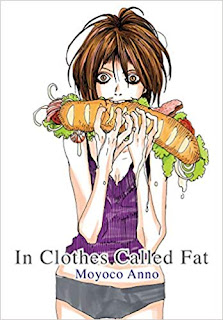So when I found out that his wife, Moyoco Anno, is a mangaka, I was more than curious about her works. Although I found her through her husband, her career certainly stands on its own, and I'm sorry I didn't discover her until now. The first of her works I picked up was In Clothes Called Fat. I settled on this for two reasons: one, the cover artwork is startling and affecting. Two, because it is one of her more available titles in the U.S and a single-volume story.
It's the story of a woman who is not skinny, dating a man for 8 years who likes that about her, and is bullied at work by the skinny bitches, one ring-leader in particular.
The artwork is fluid in a way that will be comfortable to readers of American graphic novels but distinct from the commercialized forms of manga more typical of what is translated for the American market. It's wonderful how especially in the last year (although this is a 2014 publication) we've seen a much broader representation of the Japanese manga oeuvre translated into English giving readers a greater understanding of the visual variety within the whole of manga. It's about time and that's thanks to the ever growing market for manga in the U.S. (maybe as readers from the 90s age into adults and new younger readers catch on) and that makes me happy on many levels.
I have never been overweight, or even close. So I don't pretend to review this work from a direct personal perspective, but more from a sympathetic one. I have been bullied, a lot when I was younger. But also as someone who never fit comfortably in their own skin, who looked in a mirror and saw a stranger looking back, who couldn't find a groove with other people in social situations, and who has turned to food for comfort or release, or any number of other reasons other than sustenance, I can empathize with much of this story. As I imagine, many people can. I say that because I hope that people who have never struggled with weight or an eating disorder also read this.
That being said, In Clothes Called Fat doesn't provide any answers. This is no self-help book, there is no perfect, clean ending; this isn't a rom-com. This would be closer to a more painful, and intimate, slice-of-life story than anything. It doesn't really resolve much. We are left to ponder that our lead character is likely to experience ups and downs throughout the rest of her life and wish her the best in surrounding herself with people who genuinely like her as a person so that she may experience some healing. But we can't even be sure of that.
We get some glimpses into her childhood, some understanding of a few parts of her adult life, but not enough to be an arm-chair psychologist, nor should we. Anno doesn't want us uncovering the answers in her text or art just as she's not interested in giving us those answers. This is a story of a human going through a painful human thing, told simply and with relatively spare, but powerful art.
In Clothes Called Fat also isn't perfect. I felt that one of the side characters, someone who comes to our lead's aid at work was a little too off-the-beaten-path, it broke some realism for me. I also wondered how much of the primary antagonist's actions (the work bully) I should view as real, or more metaphorical for what our lead feels and perceives. If I judged this work as purely realistic, then some of the characterizations were a bit over-dramatized. But if each character is both person and reflection of our lead's inner-emotions/perceptions, then that vividness makes more sense. Personally, I would have liked the story to be a bit subtler and more meditative, maybe even more psychologically robust, but that's me.
Overall, this is a work adults should read. I think it falls squarely in the Josei genre as it's geared for adults and for people sympathetic and interested in the adult female experience. I would not be comfortable letting my 14-year-old read this yet. The art is perfect for it, with plenty of curves in the linework which emphasizes the lead's own perceptions of her body in contrast to how others see her. However, the storytelling doesn't have as much depth or nuance as I would have loved in the topic and that holds the score back slightly. This is a strong 7/10.
✩🚺


No comments:
Post a Comment
Remember: please talk about the work, and offer counter points to others' analyses but DO NOT ATTACK THE PERSON whose analysis you are countering. (no ad hominem comments) Thanks! <3